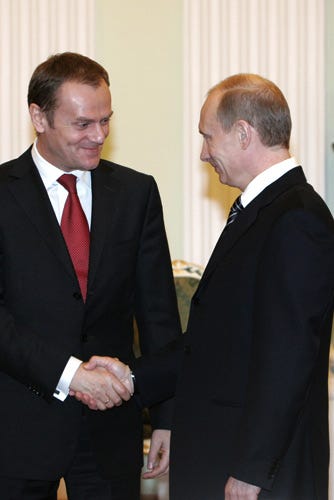Tusk's Secret Agenda: Sabotaging US Defense Contracts for German Profit
Disturbing revelations from Germany expose Donald Tusk’s plans to dismantle crucial American defense partnerships. Is Poland’s security being compromised to benefit German defense contractors?
At the beginning of the month, we wrote on our blog about the disturbing slowdown, or even halt in some cases, of the progress of the Polish army's armament under the liberal-leftist government of Donald Tusk. This is the Polish Prime Minister who has already disarmed the Polish army once before by liquidating large tactical units and selling off army assets (objects left by liquidated military units) and was politically responsible for the scandalous plans for the country's defense—declassified and revealed by the conservative governments—according to which over half of the country (from the eastern border to the Vistula line) was to be left without defense (in the event of a conflict with Russia). As we always remind you, this is also the same person who approved the scandalous agreement from 2011 between the Polish military counterintelligence SKW and the Russian FSB—agreements that de facto betrayed our NATO allies. As our readers may know, and if they do not, we hasten to inform you, Donald Tusk has been suspected by Polish conservatives for many years of being an agent of German influence. These accusations have been made several times from the Sejm rostrum and hundreds of times in journalism, but there has probably never been such confirmation of them as in recent weeks in the German media. It concerns the issue of nuclear energy (which we will write about in a separate post) and armaments. What emerges from the German press is that Tusk wants to delay and complicate orders (especially those from the US) so much that he can then cancel them and replace them with orders from... Germany.
Germany brazenly reveals its agent's plans
A recent exposé from the German daily "Die Tageszeitung" reveals alarming details about Donald Tusk's intentions towards Poland’s defense contracts. The report states explicitly, "Long-term arms contracts with American weapons producers may be canceled and replaced by European contracts," underscoring a worrying shift that aligns suspiciously well with German economic interests. It's no coincidence that the European Commission’s recently published White Paper on European Defense pushes for nations to "Buy more, better, together and European." Behind this innocuous slogan lies a clear beneficiary—Germany. As one of Europe's leading arms manufacturers, boasting firms like Rheinmetall, ThyssenKrupp, and Krauss-Maffei Wegmann or Heckler & Koch Germany clearly stands to profit immensely if Poland shifts away from American partners.
According to the German media outlet, Tusk is actively conducting an audit aimed at evaluating whether American weapon systems—like the F-35 fighters, Patriot missile defense systems, Abrams tanks, Apache helicopters, and HIMARS launchers—can function effectively without sustained support from the United States. Ostensibly framed as practical considerations, these measures seem instead designed as bureaucratic obstructions to eventually justify canceling existing American contracts in favor of German alternatives.

Old Russian trumpets are playing
It is not lost on us, nor on our discerning readers, that Tusk's government has consistently criticized past purchases made by former Defense Minister Mariusz Błaszczak, labeling them reckless and wasteful. Former President Bronisław Komorowski (and Russian friend) has openly attacked Błaszczak's purchases, saying, "Błaszczak bought like a madman. Completely without thought," dismissing strategic investments in American and South Korean technology as mere "propaganda." Such rhetoric conveniently aligns with the German narrative and provides the ideological foundation necessary to dismantle contracts vital to Poland’s defense posture.
Poland's opposition has rightly pointed out the significant risks posed by adopting the European Parliament’s recent resolutions, which aim at creating a European Defense Union. Marcin Ociepa, former Deputy Minister of Defense, warned sharply of the consequences, highlighting that "the EU today has no defensive capabilities," making any moves to supplant NATO dangerously irresponsible. Yet, Donald Tusk and his allies enthusiastically champion precisely these measures, seemingly oblivious—or indifferent—to the serious implications for Polish sovereignty and security.

PiS politicians have reacted sharply to the revelations, with former Defense Minister Mariusz Błaszczak highlighting, "Now it is the Germans who inform us about Tusk’s plans." This biting observation encapsulates the depth of betrayal at hand, underscoring the severity of Tusk’s realignment towards German industrial interests at the expense of proven American partnerships.
The implications of these actions extend far beyond mere economics. Shifting to German suppliers—under the guise of European cooperation—places Poland in a position of dependence on a neighbor whose historical relationship with Poland is fraught with complexities and often characterized by domination rather than partnership. By deliberately undermining Poland's strategic alliance with the United States, Tusk’s actions compromise Poland's geopolitical standing, weaken NATO cohesion, and threaten the foundational principles of Polish national security.
Tusk is a danger for Poland and NATO
In light of these revelations, we at "Rock Rachon We Rolling" reaffirm our deep skepticism and criticism of Donald Tusk’s dangerous trajectory. It appears clearer than ever that Tusk is not merely misguided but actively working to reshape Poland's defense strategy in a manner consistent with German economic and geopolitical ambitions. This alignment is a direct threat to Poland's sovereignty and a betrayal of the trust placed in him by Polish citizens.
As conservative voices in Poland and abroad have consistently warned, Tusk's past actions—such as the betrayal implicit in the 2011 SKW-FSB agreement—were mere preludes to the deeper geopolitical alignment we now witness. The question remains whether the Polish people will accept these maneuvers passively or demand accountability from their government for decisions that profoundly undermine their nation's security, prosperity, and independence. Our role, and that of our readers, is clear: vigilance, criticism, and unwavering defense of Poland’s national interest against any who would seek to subvert it, whether from within or abroad.







